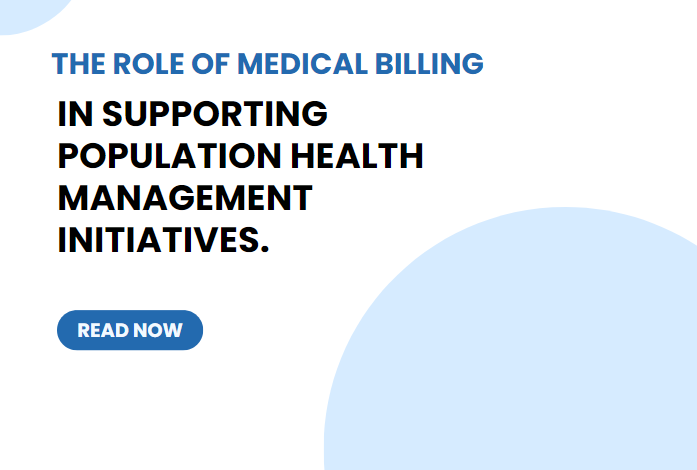
Introduction:
Population health management initiatives have become increasingly important in the healthcare landscape, aiming to improve the health outcomes of entire communities while also reducing overall healthcare costs. At the heart of these initiatives lies an often overlooked yet crucial component: medical billing services. While medical billing may seem like a mundane administrative task, its role in supporting population health management initiatives is multifaceted and integral. This article explores the significance of medical billing services in the context of population health management, shedding light on how efficient billing practices contribute to better health outcomes for communities.
Understanding Population Health Management:
Before delving into the role of medical billing services, it’s essential to grasp the concept of population health management. Population health management involves the proactive management of the health outcomes of a defined group of individuals, considering various factors such as demographics, socio-economic status, and health behaviors. The primary goal is to improve the overall health of the population while addressing health disparities and minimizing healthcare costs.
The Role of Medical Billing Services:
Medical billing services play a crucial role in supporting population health management initiatives in several ways:
Data Aggregation and Analysis:
Medical billing services collect vast amounts of healthcare data through billing processes. This data, including patient demographics, diagnoses, procedures, and outcomes, serves as a valuable resource for population health analysis. By aggregating and analyzing this data, healthcare organizations can identify trends, patterns, and areas for improvement within the population.
Revenue Optimization:
Efficient medical billing practices ensure timely and accurate reimbursement for healthcare services provided. A steady stream of revenue is essential for healthcare organizations to invest in population health management initiatives, such as preventive care programs, chronic disease management, and community outreach efforts. By optimizing revenue through effective billing processes, healthcare providers can allocate resources towards initiatives that promote population health.
Identifying High-Risk Populations:
Through medical billing data analysis, healthcare organizations can identify high-risk populations within their communities. These populations may include individuals with chronic conditions, socio-economic challenges, or limited access to healthcare services. By targeting these populations for interventions and preventive measures, healthcare providers can effectively manage chronic diseases, reduce hospitalizations, and improve overall health outcomes.
Facilitating Care Coordination:
Medical billing services play a vital role in facilitating care coordination among healthcare providers. Comprehensive billing systems often include features for documenting and sharing patient information, facilitating communication between providers, and ensuring continuity of care. Seamless care coordination is essential for population health management, particularly for individuals with complex medical needs who require ongoing support and monitoring.
Supporting Value-Based Care Models:
The shift towards value-based care models emphasizes the importance of quality outcomes and patient satisfaction over the volume of services provided. Medical billing services play a pivotal role in supporting value-based care initiatives by capturing relevant data metrics, such as patient outcomes, care coordination efforts, and preventive measures. By aligning billing practices with value-based care incentives, healthcare organizations can drive improvements in population health outcomes while achieving financial sustainability.
Promoting Preventive Care and Wellness Programs:
Medical billing services can also support population health management by promoting preventive care and wellness programs. By analyzing billing data, healthcare organizations can identify gaps in preventive care services and target interventions to promote healthier behaviors and lifestyles among the population. Medical billing systems can facilitate the implementation of wellness initiatives, such as screenings, vaccinations, and health education campaigns, by tracking patient participation and outcomes.
Enhancing Patient Engagement and Empowerment:
Effective medical billing practices contribute to enhanced patient engagement and empowerment, which are essential elements of population health management. Clear and transparent billing communication fosters trust between patients and healthcare providers, encouraging patients to take an active role in their healthcare decisions. Medical billing services can incorporate patient-friendly billing statements, online payment portals, and personalized financial counseling to empower patients to manage their healthcare expenses and adhere to treatment plans.
Supporting Population Health Research and Innovation:
Medical billing data serves as a valuable resource for population health research and innovation. Healthcare researchers can leverage billing data to conduct epidemiological studies, identify emerging health trends, and evaluate the effectiveness of interventions. By sharing anonymized billing data with research institutions and public health agencies, healthcare organizations contribute to the advancement of population health knowledge and the development of evidence-based strategies for improving health outcomes.
Addressing Social Determinants of Health:
Medical billing services play a role in addressing social determinants of health, which significantly impact population health outcomes. By capturing data on patient demographics, socio-economic status, and social risk factors, medical billing systems provide insights into the underlying determinants of health disparities within the population. Healthcare organizations can use this information to design targeted interventions that address social determinants, such as access to housing, transportation, and nutritious food, to improve overall health outcomes and reduce health inequities.
Ensuring Regulatory Compliance and Ethical Standards:
Medical billing services uphold regulatory compliance and ethical standards, safeguarding patient privacy and confidentiality. Compliance with healthcare regulations, such as HIPAA (Health Insurance Portability and Accountability Act), ensures the secure handling of patient health information throughout the billing process. Ethical billing practices prioritize accuracy, honesty, and integrity, maintaining trust and credibility within the healthcare community and the broader population. By adhering to regulatory and ethical guidelines, medical billing services contribute to the ethical conduct of population health management initiatives.
checkout the medical billing services in usa.
Conclusion:
In conclusion, the role of medical billing services in supporting population health management initiatives is multifaceted and indispensable. From data aggregation and revenue optimization to promoting preventive care and addressing social determinants of health, medical billing services play a vital role in advancing population health outcomes. Healthcare organizations must recognize the strategic importance of efficient billing practices and invest in robust billing systems, technology, and personnel to maximize their impact on population health. By leveraging medical billing services effectively, healthcare providers can achieve their population health goals, reduce health disparities, and promote the well-being of communities worldwide.
Also check how custom .net development can help you in app development.
Also read – https://toastul.com/types-of-web-hosting-and-their-differences/



